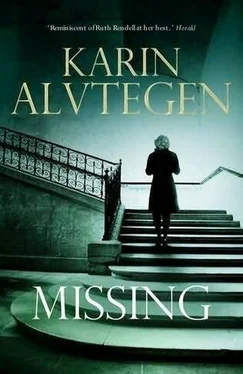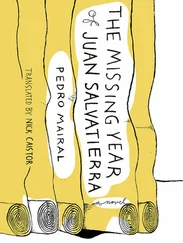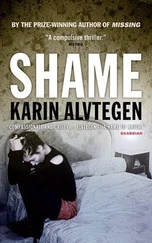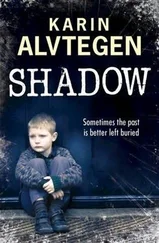She never saw her son again.
That's a fucking crime! Were they allowed to do that?' She didn't reply. She was wondering what had made her tell the story especially since she had never even mentioned it to anyone before. Her loss had been gnawing at her all the time, like a swallowed shard of glass. Its unyielding edge had kept the wound raw, but she had never before expressed her grief in words.
Maybe she had told him because he was about the same age as her son. Or maybe because of everything – the hopelessness of it all. No more point in keeping quiet.
'But what happened afterwards?'
She hesitated. These were memories she had tried hard to forget.
'They had to lock me up. I was kept in a mental hospital for almost half a year. By then I just couldn't hack it any more.'
'Jesus… were you, you know, like… crazy?'
She couldn't be bothered answering. They sat in silence for while.
'How do you mean, couldn't hack it? Did you go on the run?'
'Yes, I did. Not that I think they chased me that much. I wasn't exactly a danger to the public' Not like now, that is.
'What about your Mum and Dad? What did they say?'
'Good question. Well, they said I couldn't stay with them. I was an adult and had made my own bed and could go lie in it and so on.'
'Fucking sickoes.'
Indeed.
'Then what did you do?'
She looked at him.
'Are you always this curious?'
'I've never talked to a drifter before.'
She sighed, raising her eyes to the ceiling. Well, then. Listen and Learn.
'First I went to the nearest biggish town – it was Vaxsjo. I was scared silly that they'd find me and send me back to the hospital. I was moving about for a couple of months or so, sleeping in basements and eating what I could find.'
'How old were you?'
'It was just after my eighteenth birthday.'
'That's three years older than me.'
'Than I.'
He turned to look at her. 'Than what?'
'You should say "older than I".' He snorted.
'Were you a damn prefect at school or what?' She was smiling into the darkness. No, never a prefect. They didn't pick her.
'No, but I was rather good at Swedish – at writing essays and things.'
'Why didn't you ever get a job?'
'I didn't dare tell people my name. They might recognise it, you see. I thought they were looking for me, that I was wanted by the police.'
The last phrase brought her right back to the present. Where exactly was this chat taking her? Time to cut it short, now. 'Good night.'
He lifted his head, leaning on one elbow. 'Hey, you can't stop now.'
He sounded disappointed, but she turned her face towards the wall.
it's almost eleven o'clock and I'm tired. So, good night.'
'Please, just one more thing. How come you ended up in Stockholm? Can't you tell that bit too?'
She sighed and turned again. The lamps illuminating the clock-face were throwing their white light into the attic, but its corners remained pitch dark.
'Listen, I'll only say this much. If I were you, I'd go for a job in television. You wouldn't sleep too well if I told you about everything I've seen and done and felt on the streets.'
She stopped speaking for a moment, tried to find the right words. How much of herself could she give? Then she sat up.
'Six of these years are blanks, I hardly remember a single thing. Who I was with. Where I slept. I was drunk out of my mind most of the time. I didn't want to be able to think, because if I did I might lose my grip and sink without trace. You see, living on the street gets to you. It's really hard to pull yourself out. The main reason is that you become unable to adjust to living in other conditions. You have to be able to conform to regular society and you don't want to conform. It's a vicious circle. Patrik, you must listen to me. I know what it's like and you're just wrong about the freedom thing. It's a load of shit, all that about sleeping rough. You haven't got a fucking clue about what it's like, not really.'
She lay down again. For once Patrik was quiet, presumably silenced by her vehemence. Would he really stay all night? Maybe he was angry now?
Not another word. She could hear him stirring, testing different positions on the thin sleeping mat. Then the attic became totally quiet.
She felt too restless to sleep. Memory snapshots came and went behind her closed eyelids, in fast-changing sequences. His questions had ripped the lid off stored experiences that she had avoided for years.
The memories of hitchhiking to Stockholm in the hope of merging with the crowds in the capital and so find some way to earn a living. How frightened she had been all the time that they would trace her, catch her and lock her up in hospital again. As if anyone had cared about her absence!
Then came the slow realisation of how difficult it is for someone without money, contacts or even a name to find a safe harbour. She didn't dare use her ID number, which meant that the Job Centres were out of the question. She had taken some illegal jobs as a cleaner or dish-washer, but moved on as soon as anyone at all became curious about her. Safety seemed to be among those who only knew each other by nicknames and never asked any questions except about drink or drugs and only when necessary. In the end, hungry and tired to death, she had faced utter humiliation, swallowed her pride and phoned home to ask for help. Begging for forgiveness, she told them she wanted to come home again.
'We'll give you an allowance, Sibylla. If you give us your address, we'll send you the money.'
As always when she remembered this, her stomach contracted. If only she hadn't given in! She often thought that phone-call was harder to bear than almost anything else she had been through. It was intolerable when she spoke to her mother for the last time, she had been reduced apologising yet again.
The money started arriving. Because she had an income and a posh accent her mates called her the Queen of Småland.
Her lost years began. She spent all her energy on staying intoxicated for as much of the time as possible. Nothing else mattered. With her brain activity permanently set on Low, most things became endurable. There was even a sense of security to be gained from the degradation that meant nothing was questioned and nothing was unacceptable. Slowly but surely she adjusted to the more or less overt contempt of people she encountered. The recognition that she was a loser only sealed her solidarity with the other outcasts.
For six years, this was her life – six years outside time.
Then, a turning point. It happened when she woke up on a bench near the Slussen walkway, heavy with drink, smeared with vomit and lying in a pool of her excrement. Around her stood an entire class of little primary school kids, watching her with wonder.
'Miss. What's she doing there? Is she sick?' 'Miss. Why does she smell so?'
A wall of children, all round-eyed with astonishment at this, their first insight into the down-side of adulthood. The shocked teacher, who was about her own age, turned up and protectively herded her charges away.
'Come now. Don't look!'
Then a terrible thought struck her. Her own son might have been one of the children and the state she was in was conclusive proof that her mother's decision had been right.
She turned to look at her new-found companion. It seemed that he had managed to sleep in the end. She crawled out of her sleeping bag to put her anorak over the boy. He was lying on his back with his arms crossed over his chest to keep warm. How young he was.
His whole life ahead, unused. Somewhere her son had reached almost the same age.
She crawled back. Much longer in this attic and she'd go off her head.
Formulating this thought immediately led on to the realisation that something had happened to her – a good thing. She glanced towards her visitor again and thought that he had brought something else, much more important than spare-ribs and Coke. His respect for her as a fellow human being granted her a new kind of dignity. For some inscrutable reason he was the one who had found her here. She was made stronger by his unreserved interest and admiration for what he felt she stood for. During the last few days some of her normal instincts had seemed damaged beyond recovery, but now they were reviving. Most of all, her instinct to fight against the odds.
Читать дальше












